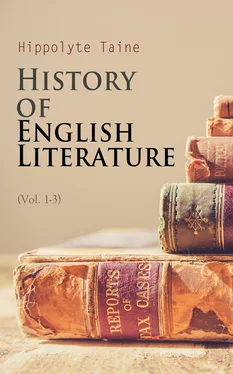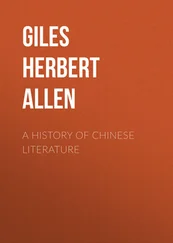Hippolyte Taine - History of English Literature (Vol. 1-3)
Здесь есть возможность читать онлайн «Hippolyte Taine - History of English Literature (Vol. 1-3)» — ознакомительный отрывок электронной книги совершенно бесплатно, а после прочтения отрывка купить полную версию. В некоторых случаях можно слушать аудио, скачать через торрент в формате fb2 и присутствует краткое содержание. Жанр: unrecognised, на английском языке. Описание произведения, (предисловие) а так же отзывы посетителей доступны на портале библиотеки ЛибКат.
- Название:History of English Literature (Vol. 1-3)
- Автор:
- Жанр:
- Год:неизвестен
- ISBN:нет данных
- Рейтинг книги:3 / 5. Голосов: 1
-
Избранное:Добавить в избранное
- Отзывы:
-
Ваша оценка:
- 60
- 1
- 2
- 3
- 4
- 5
History of English Literature (Vol. 1-3): краткое содержание, описание и аннотация
Предлагаем к чтению аннотацию, описание, краткое содержание или предисловие (зависит от того, что написал сам автор книги «History of English Literature (Vol. 1-3)»). Если вы не нашли необходимую информацию о книге — напишите в комментариях, мы постараемся отыскать её.
History of English Literature (Vol. 1-3) — читать онлайн ознакомительный отрывок
Ниже представлен текст книги, разбитый по страницам. Система сохранения места последней прочитанной страницы, позволяет с удобством читать онлайн бесплатно книгу «History of English Literature (Vol. 1-3)», без необходимости каждый раз заново искать на чём Вы остановились. Поставьте закладку, и сможете в любой момент перейти на страницу, на которой закончили чтение.
Интервал:
Закладка:
There is, nevertheless, a third order of causes, for, with the forces within and without, there is the work these have already produced together, which work itself contributes towards producing the ensuing work; beside the permanent impulsion and the given environment there is the acquired momentum. When national character and surrounding circumstances operate it is not on a tabula rasa , but on one already bearing imprints. According as this tabula is taken at one or at another moment so is the imprint different, and this suffices to render the total effect different. Consider, for example, two moments of a literature or of an art, French tragedy under Corneille and under Voltaire, and Greek drama under Æschylus and under Euripides, Latin poetry under Lucretius and under Claudian, and Italian painting under Da Vinci and under Guido. Assuredly, there is no change of general conception at either of these two extreme points; ever the same human type must be portrayed or represented in action; the cast of the verse, the dramatic structure, the physical form have all persisted. But there is this among these differences, that one of the artists is a precursor and the other a successor, that the first one has no model and the second one has a model; that the former sees things face to face, and that the latter sees them through the intermediation of the former, that many departments of art have become more perfect, that the simplicity and grandeur of the impression have diminished, that what is pleasing and refined in form has augmented—in short, that the first work has determined the second. In this respect, it is with a people as with a plant; the same sap at the same temperature and in the same soil produces, at different stages of its successive elaborations, different developments, buds, flowers, fruits, and seeds, in such a way that the condition of the following is always that of the preceding and is born of its death. Now, if you no longer regard a brief moment, as above, but one of those grand periods of development which embraces one or many centuries like the Middle Ages, or our last classic period, the conclusion is the same. A certain dominating conception has prevailed throughout; mankind, during two hundred years, during five hundred years, have represented to themselves a certain ideal figure of man, in mediæval times the knight and the monk, in our classic period the courtier and refined talker; this creative and universal conception has monopolized the entire field of action and thought, and, after spreading its involuntarily systematic works over the world, it languished and then died out, and now a new idea has arisen, destined to a like domination and to equally multiplied creations. Note here that the latter depends in part on the former, and that it is the former, which, combining its effect with those of national genius and surrounding circumstances, will impose their bent and their direction on new-born things. It is according to this law that great historic currents are formed, meaning by this, the long rule of a form of intellect or of a master idea, like that period of spontaneous creations called the Renaissance, or that period of oratorical classifications called the Classic Age, or that series of mystic systems called the Alexandrine and Christian , or that series of mythological efflorescences found at the origins of Germany, India, and Greece. Here as elsewhere, we are dealing merely with a mechanical problem: the total effect is a compound wholly determined by the grandeur and direction of the forces which produce it. The sole difference which separates these moral problems from physical problems lies in this, that in the former the directions and grandeur cannot be estimated by or stated in figures with the same precision as in the latter. If a want, a faculty, is a quantity capable of degrees, the same as pressure or weight, this quantity is not measurable like that of the pressure or weight. We cannot fix it in an exact or approximative formula; we can obtain or give of it only a literary impression; we are reduced to noting and citing the prominent facts which make it manifest and which nearly, or roughly, indicate about what grade on the scale it must be ranged at. And yet, notwithstanding the methods of notation are not the same in the moral sciences as in the physical sciences, nevertheless, as matter is the same in both, and is equally composed of forces, directions and magnitudes, we can still show that in one as in the other, the final effect takes place according to the same law. This is great or small, according as the fundamental forces are great or small and act more or less precisely in the same sense, according as the distinct effects of race, environment and epoch combine to enforce each other or combine to neutralize each other. Thus are explained the long impotences and the brilliant successes which appear irregularly and with no apparent reason in the life of a people; the causes of these consist in internal concordances and contrarieties. There was one of these concordances when, in the seventeenth century, the social disposition and conversational spirit innate in France encountered drawing-room formalities and the moment of oratorical analysis; when, in the nineteenth century, the flexible, profound genius of Germany encountered the age of philosophic synthesis and of cosmopolite criticism. One of these contrarieties happened when, in the seventeenth century, the blunt, isolated genius of England awkwardly tried to don the new polish of urbanity, and when, in the sixteenth century, the lucid, prosaic French intellect tried to gestate a living poesy. It is this secret concordance of creative forces which produced the exquisite courtesy and noble cast of literature under Louis XIV and Bossuet, and the grandiose metaphysics and broad critical sympathy under Hegel and Goethe. It is this secret contrariety of creative forces which produced the literary incompleteness, the licentious plays, the abortive drama of Dryden and Wycherly, the poor Greek importations, the gropings, the minute beauties and fragments of Ronsard and the Pleiad. We may confidently affirm that the unknown creations toward which the current of coming ages is bearing us will spring from and be governed by these primordial forces; that, if these forces could be measured and computed we might deduce from them, as from a formula, the characters of future civilization; and that if, notwithstanding the evident rudeness of our notations, and the fundamental inexactitude of our measures, we would nowadays form some idea of our general destinies, we must base our conjectures on an examination of these forces. For, in enumerating them, we run through the full circle of active forces; and when the race, the environment, and the moment have been considered—that is to say the inner mainspring, the pressure from without, and the impulsion already acquired—we have exhausted not only all real causes but again all possible causes of movement.
VI. History is a mechanical and psychological problem. Within certain limits man can foretell
Table of Contents
There remains to be ascertained in what way these causes, applied to a nation or to a century, distribute their effects. Like a spring issuing from an elevated spot and diffusing its waters, according to the height, from ledge to ledge, until it finally reaches the low ground, so does the tendency of mind or of soul in a people, due to race, epoch, or environment, diffuse itself in different proportions, and by regular descent, over the different series of facts which compose its civilization. [3]In preparing the geographical map of a country, starting at its watershed, we see the slopes, just below this common point, dividing themselves into five or six principal basins, and then each of the latter into several others, and so on until the whole country, with its thousands of inequalities of surface, is included in the ramifications of this network. In like manner, in preparing the psychological map of the events and sentiments belonging to a certain human civilization, we find at the start five or six well determined provinces—religion, art, philosophy, the state, the family, and industries; next, in each of these provinces, natural departments, and then finally, in each of these departments, still smaller territories until we arrive at those countless details of life which we observe daily in ourselves and around us. If, again, we examine and compare together these various groups of facts we at once find that they are composed of parts and that all have parts in common. Let us take first the three principal products of human intelligence—religion, art, and philosophy. What is a philosophy but a conception of nature and of its under the form of abstractions and formulas? What underlies a religion and an art if not a conception of this same nature, and of these same primordial causes, under the form of more or less determinate symbols, and of more or less distinct personages, with this difference, that in the first case we believe that they exist, and in the second case that they do not exist. Let the reader consider some of the great creations of the intellect in India, in Scandinavia, in Persia, in Rome, in Greece, and he will find that art everywhere is a sort of philosophy become sensible, religion a sort of poem regarded as true, and philosophy a sort of art and religion, desiccated and reduced to pure abstractions. There is, then, in the centre of each of these groups a common element, the conception of the world and its origin, and if they differ amongst each other it is because each combines with the common element a distinct element; here the power of abstraction, there the faculty of personifying with belief, and, finally, the talent for personifying without belief. Let us now take the two leading products of human association, the Family and the State. What constitutes the State other than the sentiment of obedience by which a multitude of men collect together under the authority of a chief? And what constitutes the Family other than the sentiment of obedience by which a wife and children act together under the direction of a father and husband? The Family is a natural, primitive, limited state, as the State is an artificial, ulterior, and expanded Family, while beneath the differences which arise from the number, origin, and condition of its members, we distinguish, in the small as in the large community, a like fundamental disposition of mind which brings them together and unites them. Suppose, now, that this common element receives from the environment, the epoch, and the race peculiar characteristics, and it is clear that all the groups into which it enters will be proportionately modified. If the sentiment of obedience is merely one of fear, [4]you encounter, as in most of the Oriental states, the brutality of despotism, a prodigality of vigorous punishments, the exploitation of the subject, servile habits, insecurity of property, impoverished production, female slavery, and the customs of the harem. If the sentiment of obedience is rooted in the instinct of discipline, sociability, and honor, you find, as in France, a complete military organization, a superb administrative hierarchy, a weak public spirit with outbursts of patriotism, the unhesitating docility of the subject along with the hotheadedness of the revolutionist, the obsequiousness of the courtier along with the reverse of the gentleman, the charm of refined conversation along with home and family bickerings, conjugal equality together with matrimonial incompatibilities under the necessary constraints of the law. If, finally, the sentiment of obedience is rooted in the instinct of subordination and in the idea of duty, you perceive, as in Germanic nations, the security and contentment of the household, the firm foundations of domestic life, the slow and imperfect development of worldly matters, innate respect for established rank, superstitious reverence for the past, maintenance of social inequalities, natural and habitual deference to the law. Similarly in a race, just as there is a difference of aptitude for general ideas, so will its religion, art, and philosophy be different. If man is naturally fitted for broader universal conceptions and inclined at the same time to their derangement, through the nervous irritability of an overexcited organization, we find, as in India, a surprising richness of gigantic religious creations, a splendid bloom of extravagant transparent epics, a strange concatenation of subtle, imaginative philosophic systems, all so intimately associated and so interpenetrated with a common sap, that we at once recognize them, by their amplitude, by their color, and by their disorder, as productions of the same climate and of the same spirit. If, on the contrary, the naturally sound and well-balanced man is content to restrict his conceptions to narrow bounds in order to cast them in more precise forms, we see, as in Greece, a theology of artists and narrators, special gods that are soon separated from objects and almost transformed at once into substantial personages, the sentiment of universal unity nearly effaced and scarcely maintained in the vague notion of destiny, a philosophy, rather than subtle and compact, grandiose and systematic, narrow metaphysically [5]but incomparable in its logic, sophistry, and morality, si poesy and arts superior to anything we have seen in lucidity, naturalness, proportion, truth, and beauty. If, finally, man is reduced to narrow conceptions deprived of any speculative subtlety, and at the same time finds that he is absorbed and completely hardened by practical interests, we see, as in Rome, rudimentary deities, mere empty names, good for denoting the petty details of agriculture, generation, and the household, veritable marriage and farming labels, and, therefore, a null or borrowed mythology, philosophy, and poesy. Here, as elsewhere, comes in the law of mutual dependencies. [6]A civilization is a living unit, the parts of which hold together the same as the parts of an organic body. Just as in an animal, the instincts, teeth, limbs, bones, and muscular apparatus are bound together in such a way that a variation of one determines a corresponding variation in the others, and out of which a skilful naturalist, with a few bits, imagines and reconstructs an almost complete body, so, in a civilization, do religion, philosophy, the family scheme, literature and the arts form a system in which each local change involves a general change, so that an experienced historian, who studies one portion apart from the others, sees beforehand and partially predicts the characteristics of the rest. There is nothing vague in this dependence. The regulation of all this in the living body consists, first, of the tendency to manifest a certain primordial type, and, next, the necessity of its possessing organs which can supply its wants and put itself in harmony with itself in order to live. The regulation in a civilization consists in the presence in each great human creation of an elementary producer equally present in other surrounding creations, that is, some faculty and aptitude, some efficient and marked disposition, which, with its own peculiar character, introduces this with that into all operations in which it takes part, and which, according to its variations, causes variation in all the works in which it cooperates.
Читать дальшеИнтервал:
Закладка:
Похожие книги на «History of English Literature (Vol. 1-3)»
Представляем Вашему вниманию похожие книги на «History of English Literature (Vol. 1-3)» списком для выбора. Мы отобрали схожую по названию и смыслу литературу в надежде предоставить читателям больше вариантов отыскать новые, интересные, ещё непрочитанные произведения.
Обсуждение, отзывы о книге «History of English Literature (Vol. 1-3)» и просто собственные мнения читателей. Оставьте ваши комментарии, напишите, что Вы думаете о произведении, его смысле или главных героях. Укажите что конкретно понравилось, а что нет, и почему Вы так считаете.












